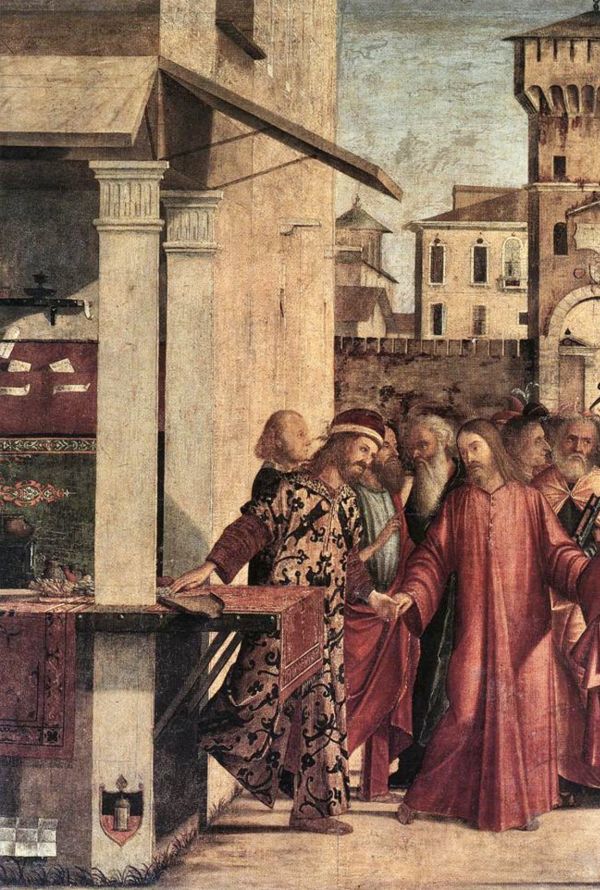But can he participate in the ritual? Sitting and with his eye on the registers, only then rich - nay, 'sir'
(Mt 9:9-13)
Friction arose in some assemblies of believers, because some church members still considered profane to have contact or accept foreigners, not yet adapted to the mentality of customs.
Even the Judeo-Christians of Galilee and Syria to whom Mt addresses needed to learn to break the isolation of the norms of ancient purity. They didn’t have to stand aside.
The friction of opinions was particularly acute in the [typical third-generation] debate on the kind of eligible participation in meetings and at Breaking the Bread.
Prohibition must be replaced by friendship.
The Father is a friendly Presence. His life-saving initiative is for everyone, even for those who don't know how to do anything but look after their own gain.
The faithful in Christ share the holy Banquet with pagans and sinners, without first demanding a discipline of the arcane, nor practices that celebrate distances (such as ablutions that at the time were preceding the meal).
Matathiah means "man of God", "given by God"; precisely «Gift of God» [Matath-Yah].
In short, according to Jesus’ teaching, the only impurity is that of not giving space to those who ask because they have none.
The observant sects of Judaism treated tax collectors as unclean beings, to be kept at a distance.
The germ of alternative society of believers in Christ accepts them and seizes their resources, the good for the community.
The anxiety of contamination arose from a false, preconceived and exclusivist idea of what not only in Palestine but even in the Diaspora was identified (by total squint) with «the Will of Yahweh» - factor of separation among other peoples.
An illusion that had not stimulated an attitude of sympathy towards diverse reality, nor of friendliness towards others outside the circle consortia.
Lord wants to share with transgressors, not because of an ideological banality: it’s the invitation to recognize oneself in another.
Not to submit ourselves to some form of humiliating paternalism, but because knowing oneself incomplete is a resource.
«And it happened that while He was lying at lunch in the House, behold, many tax collectors and sinners who had come to the feast with Jesus and his disciples» [v.10].
«Lying on the triclinia»: according to the way of celebrating solemn banquets, by free men - now all free ‘sirs’. How wonderful, such a monstrance!
A living Body of Christ that smells of Sharing: authentic Worship!
This is, all empathic and regal, the beautiful awareness that opens wide and makes credible the content of the Announcement [vv.12-13].
Christ calls, welcomes and redeems also “the Matthew in us”, that is, the most worn-out side of our personality. He will even make it flourish: and it will become an indispensable and winning aspect of the future testimony.
Tao Tê Ching [XLV] says: «Great straightness is like sinuosity, great ability is like ineptitude, great eloquence is like stuttering».
Among the disciples, it is likely that there were quite a few members of the Palestinian resistance: guerrillas fighting against the Roman occupiers.
On the other hand, here Jesus calls a collaborator of the Romans who let himself be guided by the advantage.
As if to say: the new community of sons and brothers doesn’t cultivate privileges, separations, oppressions, hatreds.
The Master always stood above the political clashes, ideological distinctions and external disputes of time.
In his Church there is a strong sign of discontinuity.
He does not invite the best or the worst to follow, but opposites - even of our own personality. He wants to dispose us «to conversion» (Lk 5:32): to make us change our point of view, mentality, principles, way of being.
In this adventure we are not called to forms of dissociation. We start from ourselves.
Thus Jesus inaugurates a new kind of relationships, even within us. A New Covenant, of fruitful differences.
It's not ‘perfection’ or narcissism that makes us love the Exodus.
To internalize and live the message:
What is your spiritual strength? How did it generate?
[St Matthew Ap. Ev. September 21, 2024]












